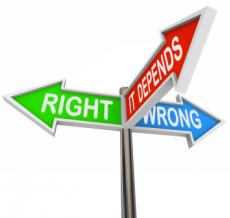
Email: emanuelealbertocirello.98@gmail.com
Total Article : 76
About Me:I am a Year 13 student which aspires to be an architect. I am interested in anything I don't yet know, and I mostly write about art, politics , Italian culture and inspirational people, although I will try to write for as many categories possible, just to test myself and get to know more things.

Virtue ethics (VE) holds great strength in its attempt to link ethical theory with ethical practice; it can be widely applied without the reliance of God, and therefore appeals to both theists and atheists. VE focuses on cultivating good people from which good actions will follow, rather than following legalistic rules; thus allowing personal autonomy. Elizabeth Anscombe urged to return to morality based on human flourishing. Proposing her own version of ‘motive virtue ethics’ highlighting the importance of a theory that focuses on doing the right thing, simply because it is the right thing to do, and not because one is following rules they feel obliged to do. Anscombe argues that ethical codes that lay stress on moral absolutes and laws are useless in a society, which has effectively abandoned God. For example, many choose to ignore the Ten Commandments like Richard Taylor.
Taylor rejecting a system of divine command ethics emphasises his belief that Christianity’s advocation of human equality does not encourage individuals to strive to be great. Instead, it creates promotors of a self-negating humility. Through this, religion takes a negative approach, stating commands such as ‘do not kill’, ‘do not commit adultery’, instead of promoting positive attributes. Nevertheless, Jesus could be used as a contrast to this as Jesus was seen as a virtuous person. Ultimately, Taylor highlights the power of VE through criticising other ethical approaches that focus on following rules, e.g. Deontology.
Phillipa Foot argued that although virtues could not guarantee happiness, they could help to achieve it. Foot identifies the problem with being naturally moral. A naturally moral person will not steal because they know it is wrong, but it does not mean that the thought ‘never entered their head.’ Whilst a virtuous person will not have these immoral thoughts because it is not within their character. Alasdair MacIntyre noted that naturalistic theories are of little value as they are too complex but believes our society has lost track of our virtues. He believes a moral society would be one in which people recognise and accept common virtues, thus emphasising the importance being virtuous.
Although, there is the issue of uncertainty between what a virtue really is, and when it becomes a vice - it is all rather subjective. Keenan asks what sort of virtuous person should one become? In addition, how should we measure a virtue? The relativist approach relies on people generally having the same interpretation of a virtue and a vice. In response to the idea of not being constricted by rules, we still do not have the freedom that VE suggests we do. Louden argues that in our day-to-day lives, we cannot just imagine what our virtuous role models would do- we think for ourselves. Without rules, humans will act instinctively, rather than imagining some ‘virtuous person.’ William Frankence stated that ‘virtues without principles are blind,’ how do you know what habits are genuine or proper virtues? The epistemic issue cannot be resolved as you continuously end up in a circle of reasoning.
A major weakness is identified by MacIntyre’s reliance on community to bring about a moral society. In some countries, it is virtuous to marry a 12-year-old girl. Is this right in our society? No. How is it possible to reach a ‘golden mean’ if different countries have different virtues? The focus of VE is on an individual; it cannot be universally applied and will not resolve major dilemmas across the globe.
Conclusively, I feel that it is appropriate to reject VE as a method to resolve moral dilemmas on the grounds that is impractical. Whilst I agree with Taylor in the idea that following divine commands discourages people from reaching their full potentials, this does not mean that a weakness of another theory rises VE. I think it is naive to assume that everyone strives for goodness, as we develop as humans we can learn right from wrong but ultimately we cannot become the perfect being who does not even think of doing wrong. Most of our actions are based on an outcome therefore, I would reject VE. A theory that is subjective cannot be valued as ‘people find their good in many different ways,’- Owen Flanagan.
Image credits: http://blueboat.blogs.uua.org/2012/04/20/virtue-ethics-new-from-tapestry-of-faith/

0 Comment:
Be the first one to comment on this article.